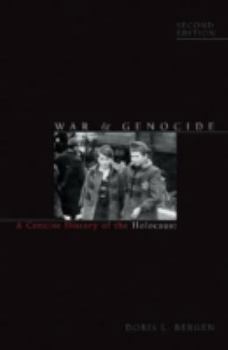War & Genocide: A Concise History of the Holocaust
Select Format
Select Condition 
Book Overview
In examining one of the defining events of the twentieth century, Doris L. Bergen situates the Holocaust in its historical, political, social, cultural, and military contexts. Unlike many other... This description may be from another edition of this product.
Format:Paperback
Language:English
ISBN:0742557154
ISBN13:9780742557154
Release Date:February 2009
Publisher:Rowman & Littlefield Publishers
Length:279 Pages
Weight:0.90 lbs.
Dimensions:0.5" x 5.9" x 8.9"
Customer Reviews
4 ratings
this is a fine book
Published by Thriftbooks.com User , 14 years ago
Professor Bergen has really written an outstanding short account of the Holocaust. "Concise" is exactly right. But this book is thorough, too. Bergen's book would make an excellent starting point for anyone interested in delving into further research into the Holocaust. The bibliography makes such an effort easy. I particularly appreciated the author's discussion of the Nazi plan to annihilate Europe's Gypsy population, since this topic is usually overlooked in historical accounts of the era.
Helpful overview for students of the Holocaust
Published by Thriftbooks.com User , 16 years ago
This is a great little book for anyone who wants a concise but detailed and interesting overview of the Holocaust. It is easy to read, well laid out, and provides enough historical information for students and the general public alike. Any high school or college student who is studying modern European history will find this extremely useful.
Brief but comprehensive
Published by Thriftbooks.com User , 19 years ago
Dr. Doris L. Bergen has been a history professor since 1991 at University of Vermont and the University of Notre Dame. Her research and written works on Nazism, the Third Reich, Christian antisemitism, and the Volksdeutschen have made her especially qualified to write this brief history of the Holocaust. There is no specific mention of any direct or familial involvement with the Second World War (Bergen 263). War & Genocide: A Concise History of the Holocaust has an extensive bibliography which covers the entire spectrum on this topic, including general and specialized secondary research, official records, and firsthand accounts in the form of diaries and journals. While unbiased accounts are the goal in historical research, it is extraordinarily difficult to be without an anti-Nazi bias when writing on the Holocaust. Such a traumatic event in the course of human affairs is inherently and undeniably emotional. A dispassionate account of the Holocaust would not only be uninteresting, it would be inappropriate on many important levels. Bergen uses her talents of discretion to balance the work by making it accessible on an emotional level to even serious students of history while not letting her anti-Nazi bias destroy the validity of her research. The book is intended to be a concise history of the larger events of the Nazi takeover of Europe and their extermination of "undesirables." Bergen accomplishes this by describing the major and pertinent events of the period with minimal digression. She also keeps the events of the Holocaust in context of the larger context of the war in such a way that the reader is not lost in the details. This book attempts to give a human face to the atrocities committed by human beings on their fellow men, women, and children; it attempts to give a palpable understanding of the driving forces that made ordinary men into murderers and monsters; and it attempts to make the reader pause and reflect on this nightmarish catastrophe in an attempt to keep such a Holocaust from happening again. This book describes the origins and policies of the National Socialist German Workers Party (Nazi) and is careful to display evidence that their rise to power was far from inevitable. According to Bergen, the Nazis didn't pick new or arbitrary groups to focus their hatred on, instead they "reflected and built on prejudices that were familiar" in pre-Nazi Germany (1). The book exposes the friendly forces in the Weimar government that contributed to Hitler's ride by pushing aside the laws that could have stopped the Nazi party. These laws that "were simply not enforced" (48) allowed Adolf Hitler, an Austrian convicted of treason, to escape a serious jail sentence, become a German citizen, and run for president. Bergen claims "Without Hitler, Nazism, World War II, and the Holocaust would have taken very different forms, if they had occurred at all" (31). In the course of supporting these claims, the book follows the
exceptionally useful and moving
Published by Thriftbooks.com User , 20 years ago
This is an exceptionally useful and moving textbook on the Third Reich, World War Two, and the Holocaust. My students' response in an upper-level course on German history was outright enthusiastic. The range of aspects covered in this volume is impressive: we learn about the wider European cultural-ideological context as well as about specifically German preconditions for Nazi policies; the author discusses internal developments in the Third Reich as well as the international repercussions of war and genocide. Perhaps most important, Bergen confronts the difficult moral questions of these devastating and dramatic events. This is one of the most intelligent and helpful treatments of this topic. Bergen's writing sets new standards for clarity when relating complex historical developments.




